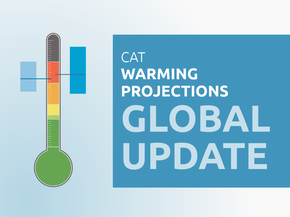Fair Share
National target
We rate the UK’s national target for 2030 as "Insufficient". As part of the EU, the UK did not submit its own NDC to the Paris Agreement. Therefore, we assess the 2030 emissions levels derived from the UK's national targets.
The “Insufficient” rating indicates that the UK's climate commitment in 2030 is not consistent with holding warming to below 2°C, let alone limiting it to 1.5°C as required under the Paris Agreement. The emission levels of the UK’s national target falls just within the very top end of the wide range of emissions levels that represent its fair share effort to the Paris Agreement 1.5°C temperature goal. As we explain elsewhere, commitments within the least stringent part of a country’s fair-share range would require other governments to do comparatively more. If all countries were to realise emissions at the top of their respective fair-share ranges, this would add up to global warming substantially above 2°C, so that for all countries, emissions levels just below the top end of a fair-share range would be rated insufficient.
Substantially deeper reductions by 2030 would move the UK’s national targets towards compatibility with the Paris Agreement 1.5°C temperature goal. Rating individual member states as part of the EU is difficult because of the internal burden sharing system, interlinkage of the actions through the emission trading system and redistribution of financial flows, linked electricity sector. We therefore do not provide a 1.5°C and 2°C temperature levels for EU member states.
Current policy projections
The UK’s CAT rating is based on the emission reduction commitments put forward in its national target.
If the CAT were to rate the UK‘s projected emissions levels in 2030 under current policies, the UK would be rated “Highly insufficient”.
Further information about the risks and impacts associated with the temperature levels of each of the categories is available here.
Further analysis
Latest publications
Stay informed
Subscribe to our newsletter




